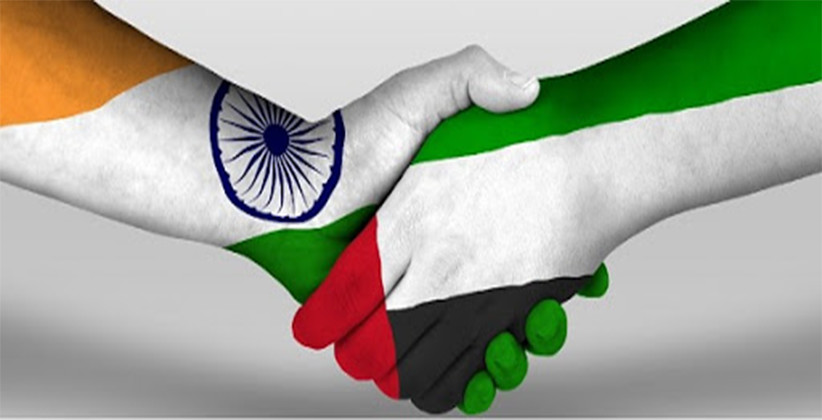Articles

#CPPRWebinar “Enrica Lexie Award: The Takeaways for India”
July 16, 2020
Street Vendors and COVID-19 lockdowns | #PolicyBeyondPolitics EP 07
July 20, 2020India and UAE Need to Strengthen Economic Ties

India and the United Arab Emirates established diplomatic relations in 1972; the UAE Embassy in India was opened in 1972, while the Indian Embassy in the UAE was opened in 1973. Both sides have since signed MoUs on strengthening cooperation in cyber space, defence, maritime/road transport, SME, agriculture, manpower, human trafficking, entry visa exemption for diplomatic, special and official passport holders, media, energy, etc, entering a Comprehensive and Strategic Partnership.
In addition to the UAE’s Consulate General in Thiruvananthapuram, it has two other representations in India—an embassy in New Delhi and a Consulate General in Mumbai. India also has two representations in the UAE—an embassy in Abu Dhabi and a Consulate General in Dubai.
The Consulate General of the UAE in Thiruvananthapuram facilitates attestation and visa for around 700 people daily and also extends services to the neighbouring States of Tamil Nadu, Andhra Pradesh, Telangana and Karnataka. Besides the objective of speeding up issuing of visas and other documents, the Consulate also improves bilateral relations, especially trade relations.
The Consulate also takes interest in giving the right feedback about the changing trends in skill expectations in jobs in the UAE to help the Skill India Mission and agencies like NORKA in focusing on their training modules. It streamlines the grievances redressal mechanism to address the problems faced by the non-resident Keralites in the UAE.
On the economic front, India’s trade with the GCC countries has shown a robust growth in the past 12 months, with imports from the Gulf countries reaching US$ 79.70 billion which is almost double the $41.55 billion exports from India to the Gulf region. Among the gulf countries, the UAE accounted for the major chunk of India’s exports and imports which stood at a whooping US$ 30.08 billion and US$ 29.77 billion, respectively in FY19. With a robust flow of bilateral investments and an annual bilateral trade of about US$ 70 billion, the UAE is India’s third-largest trading partner after the US and China. It is also India’s fourth-largest exporter of crude oil. On the contrary, the UAE accounts for 9 per cent of India’s total export and 5.80 per cent of India’s import by value.
The imports from the UAE have seen a significant increase in April–March 2019, registering a 36 per cent growth, while exports from the UAE to India have also grown by 6.90 per cent in FY19. According to the official trade data compiled by the Directorate General of Commercial Intelligence and Statistics (DGCIS), Commerce Ministry, India’s imports of gems and jewellery from the UAE have seen a decline of 13 per cent and its exports of these products to the UAE have also fallen by 3 per cent in FY19 over the previous fiscal. On the FDI front for the UAE, Abu Dhabi National Oil Company (ADNOC), one of the world’s largest petroleum firms, has offered to invest in a petrochemical complex in Kochi, Kerala.
The UAE has a decades-long connection with Kerala. The migrants from Kerala have dominated the service sector of the UAE and according to the Kerala Migration Survey (KMS) report, a majority of the migrants from Kerala live in the Gulf region. Half of the Keralites working in the Gulf live in two countries—the UAE (41.5 per cent) and Qatar (8.5 per cent). This reflects in the foreign remittances that Kerala receives from abroad which form an important constituent of the economy of both Kerala and India. According to a Business Today report, Kerala receives the maximum amount of remittances in India (40 per cent of all inward money), followed by Punjab (12.7 per cent), Tamil Nadu (12.4 per cent), Andhra Pradesh (7.7 per cent) and Uttar Pradesh (5.4 per cent). According to a research paper, remittances comprise approximately 36 per cent of Kerala’s total GDP. The total remittances to Kerala are estimated at around `90,000 crore, most of which come from the Gulf.
Now with the COVID-19 pandemic, there will be a revenue loss for the State due to the effects of the lockdown and loss in remittances from the Gulf nations. The State also expects more than 500,000 Keralites to return home. This figure is almost certainly an underestimate. Many others will make the return journey months from now, as companies and governments cut more jobs in the Gulf. The diaspora is in distress and must be taken care of as they are losing their livelihoods in the GCC. The recent gold bust involving the UAE Consulate in Thiruvananthapuram is a serious and unfortunate incident. The Indian authorities both at Centre and State must be vigilant and mindful to not risk the strong cultural and economic ties between the two countries. The State of Kerala should come up with a policy mechanism to address these issues.
Views expressed are personal and need not reflect or represent the views of Centre for Public Policy Research.
Gazi Hassan is a Research Scholar of International Politics at CPPR, focused on Indo-Pacific dynamics. He has an MPhil in International Studies (Jamia Millia Islamia) and an MA in Peace Building and Conflict Analysis (Nelson Mandela Centre for Peace and Conflict Resolution, JMI).

